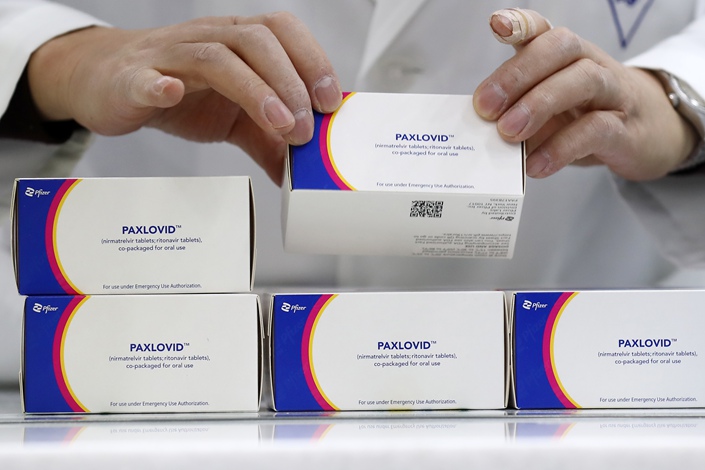
Pfizer’s oral Covid-19 Paxlovid pill was conditionally approved by the National Medical Products Administration (NMPA) of China on Feb. 12. This is an important step taken by China in its pandemic prevention and control. This undoubtedly sends a positive signal, but there is a long way to go before we can see real effects.
Paxlovid is very effective against Covid-19. According to clinical trials, if high-risk groups — those not vaccinated and having a high risk of being severely affected — are administered with Paxlovid in the early stage, which is within five days after showing symptoms, it will lower the risk of hospitalization or death by nearly 90%.
Based on NMPA’s conditional approval, Paxlovid can be used to treat adults who have mild to moderate Covid-19 and are at a high risk of progressing toward more severe conditions. Similar measures have been taken in Europe and North America. However, the U.S. has limited the age limit for patients to above 12 years old, which is the biggest difference between China and the U.S. in the approval of Paxlovid. Looking at the clinical trials, Pfizer only enlisted volunteers above 18.
As for supply, according to a January report, Pfizer will provide 120 million courses of Paxlovid in 2022, much more than the 50 million courses estimated in November 2021.
However, they will be unevenly distributed, with 6 million to 7 million courses in the first quarter of 2022, 30 million in total for the first half of the year, and the remaining 90 million in the second half. We can expect that China will only be able to purchase a limited number of Paxlovid pills in the first half of 2022, no matter at what cost. Besides, we should note that many countries have signed contracts with Pfizer, with a set delivery time. Therefore, China will only have access to the amount of the drug that has not been already ordered.
Looking at the purchase volume and delivery volume of the U.S., the largest buyer, we can calculate how much China will be able to buy, and of course, this is done by deducting the order quantity of the U.S. from the total output. The U.S. has ordered 20 million courses, half of which are scheduled for delivery before the end of June. Looking at the actual delivery, as of the end of January, the U.S. government has been provided with 260,000 courses, as originally expected. Recently, nearly 100,000 courses have been supplied every two weeks. These numbers are in line with the delivery timeline Pfizer expected, but they also reflect the limited production of Paxlovid. At present, the most important thing for the Chinese government is to finish the purchase with a set order quantity and delivery time.
As for the purchase price for respective countries, the U.S. pays $530 for each course. However, this is the negotiated price between the U.S. government and Pfizer, not a fixed drug price. The negotiated price varies from country to country. Generally speaking, international pharmaceutical companies, including Pfizer, price their drugs with reference to the income level of the local market, therefore, it can be expected that the price of the drug in China will be set much lower than in Europe and the U.S. Naturally, those who pay less will be at a disadvantage when it comes to the priority of drug supply. However, with China’s large population and the huge market size, there is room for negotiation. Even if the drug price per unit is lower, the large order quantity can push up the total value of the order. This can be used in China’s favor.
The U.S.’s purchase price may not be a useful reference for China, but its negotiated “most favored nation” (MFN) clause is. The MFN pricing rule in drug procurement means that if the pharmaceutical supplier offers a lower price to another country, the country with MFN clause will automatically enjoy the new lower price. With this clause, the country will not be at risk of spending too much, even if it purchases the drug earlier than other countries. Of course, the MFN clause is generally limited to countries with similar economic levels. For example, the MFN price of Paxlovid offered to the U.S. is aligned with the prices offered to the UK, France, Germany, Italy, Canada and Japan. China could also consider reducing its own risk in a similar way.
The approval of Paxlovid in China is good news. In overall pandemic prevention, the Covid-19 oral medicine is far less important than a highly effective vaccine. In the era of globalization, there is no need to compromise on quality just because of a product’s place of origin.
Zhou Yebin is a science columnist with a Ph.D. in genetics and genomics from the University of Alabama at Birmingham.
The views and opinions expressed in this opinion section are those of the authors and do not necessarily reflect the editorial positions of Caixin Media.
If you would like to write an opinion for Caixin Global, please send your ideas or finished opinions to our email: opinionen@caixin.com
Get our weekly free Must-Read newsletter.







